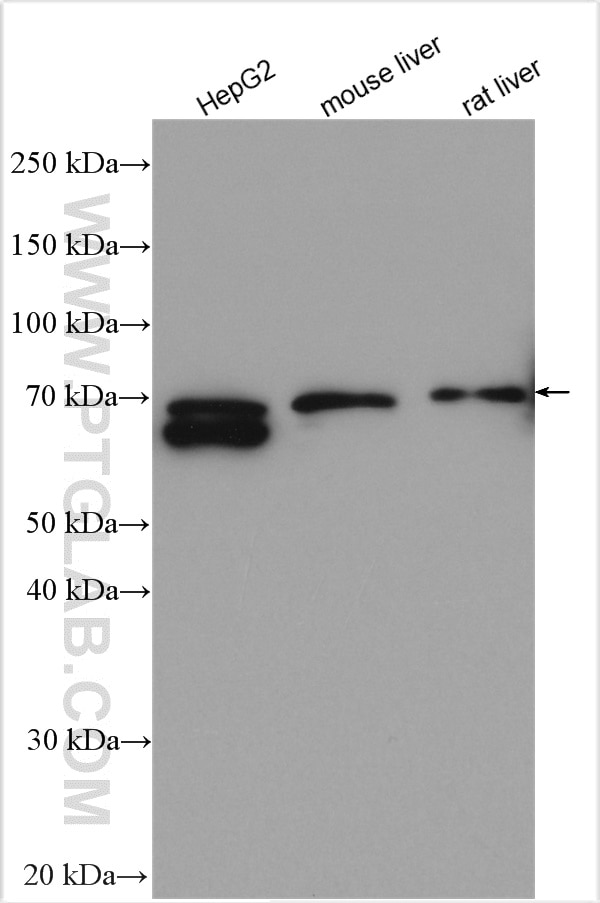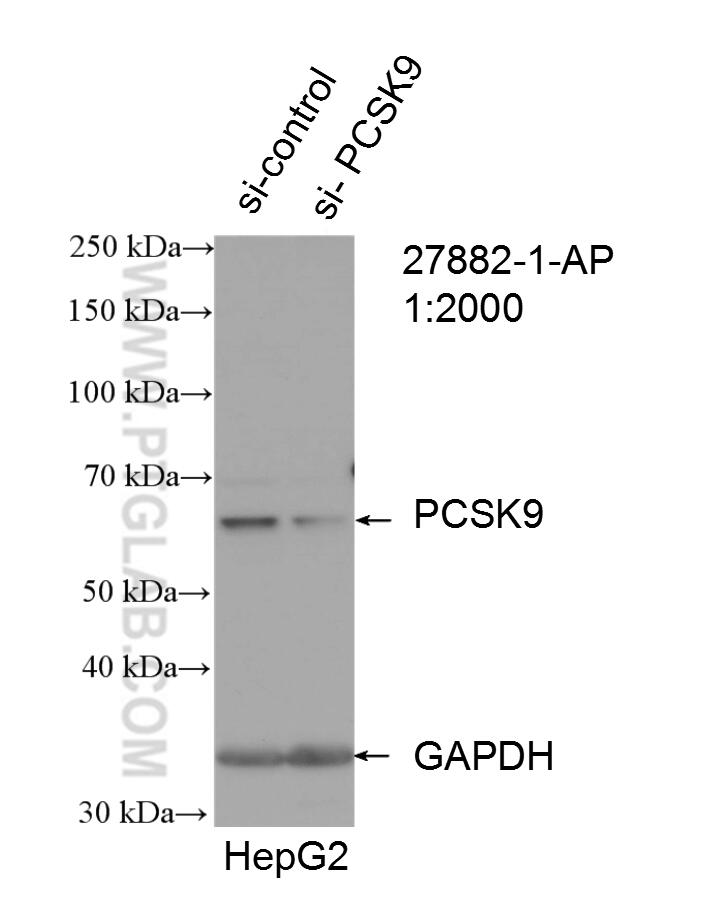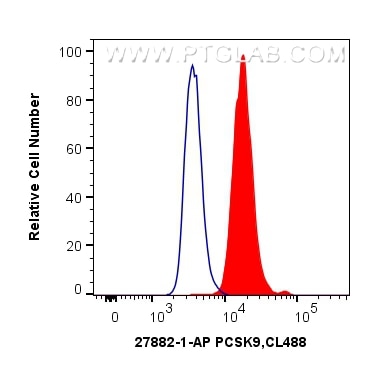- Phare
- Validé par KD/KO
Anticorps Polyclonal de lapin anti-PCSK9
PCSK9 Polyclonal Antibody for FC, WB, ELISA
Hôte / Isotype
Lapin / IgG
Réactivité testée
Humain, rat, souris
Applications
WB, IHC, IF, FC, ELISA
Conjugaison
Non conjugué
N° de cat : 27882-1-AP
Synonymes
Galerie de données de validation
Applications testées
| Résultats positifs en WB | cellules HepG2, tissu hépatique de rat, tissu hépatique de souris |
| Résultats positifs en cytométrie | cellules HepG2, |
Dilution recommandée
| Application | Dilution |
|---|---|
| Western Blot (WB) | WB : 1:500-1:2000 |
| Flow Cytometry (FC) | FC : 0.40 ug per 10^6 cells in a 100 µl suspension |
| It is recommended that this reagent should be titrated in each testing system to obtain optimal results. | |
| Sample-dependent, check data in validation data gallery | |
Applications publiées
| KD/KO | See 1 publications below |
| WB | See 5 publications below |
| IHC | See 3 publications below |
| IF | See 2 publications below |
Informations sur le produit
27882-1-AP cible PCSK9 dans les applications de WB, IHC, IF, FC, ELISA et montre une réactivité avec des échantillons Humain, rat, souris
| Réactivité | Humain, rat, souris |
| Réactivité citée | rat, Humain, souris |
| Hôte / Isotype | Lapin / IgG |
| Clonalité | Polyclonal |
| Type | Anticorps |
| Immunogène | PCSK9 Protéine recombinante Ag27254 |
| Nom complet | proprotein convertase subtilisin/kexin type 9 |
| Masse moléculaire calculée | 74 kDa |
| Poids moléculaire observé | 72-78 kDa, 62 kDa |
| Numéro d’acquisition GenBank | NM_174936.3 |
| Symbole du gène | PCSK9 |
| Identification du gène (NCBI) | 255738 |
| Conjugaison | Non conjugué |
| Forme | Liquide |
| Méthode de purification | Purification par affinité contre l'antigène |
| Tampon de stockage | PBS avec azoture de sodium à 0,02 % et glycérol à 50 % pH 7,3 |
| Conditions de stockage | Stocker à -20°C. Stable pendant un an après l'expédition. L'aliquotage n'est pas nécessaire pour le stockage à -20oC Les 20ul contiennent 0,1% de BSA. |
Informations générales
Proprotein convertase subtilisin/kexin type 9 (PCSK9) is a crucial protein governing the circulating levels of low density lipoprotein-cholesterol (LDL-C), by virtue of its pivotal role in the degradation of the LDL receptor (LDLR). PCSK9 is expressed in the kidney and lung. It is synthesized as a 72 kDa immature precursor that undergoes autocatalytic cleavage in the endoplasmic reticulum to generate a 63 kDa mature protein. The cleaved N-terminal fragment remains associated with the mature protein and is necessary for its secretion, allowing it to circulate in the blood. The ability of PCSK9 to regulate a diverse group of cell-surface proteins hinted that it might also be able to influence additional membrane proteins that are important in anti-tumour immune responses. Targeting PCSK9 to treat cancer is also attractive because two neutralizing antibodies against it, evolocumab and alirocumab, have already been approved for human clinical use to lower cholesterol levels. (PMID: 30522786, PMID: 22493497)
Protocole
| Product Specific Protocols | |
|---|---|
| WB protocol for PCSK9 antibody 27882-1-AP | Download protocol |
| FC protocol for PCSK9 antibody 27882-1-AP | Download protocol |
| Standard Protocols | |
|---|---|
| Click here to view our Standard Protocols |
Publications
| Species | Application | Title |
|---|---|---|
Biochimie High-salt diet induces dyslipidemia through the SREBP2/PCSK9 pathway in dahl salt-sensitive rats | ||
bioRxiv Effect of Total Sphingomyelin Synthase Activity on Low Density Lipoprotein Catabolism in Mice | ||
iScience Targeting PCSK9 reduces cancer cell stemness and enhances antitumor immunity in head and neck cancer
| ||
FASEB J Exogenous hydrogen sulfide alleviates hepatic endoplasmic reticulum stress via SIRT1/FoxO1/PCSK9 pathway in NAFLD | ||
JACC Basic Transl Sci PCSK9 Promotes Hypoxia-Induced EC Pyroptosis by Regulating Smac Mitochondrion-Cytoplasm Translocation in Critical Limb Ischemia | ||
Oncol Lett PCSK9 promotes tumor cell proliferation and migration by facilitating CCL25 secretion in esophageal squamous cell carcinoma |




